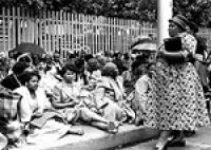This is a brief insight into South Africa’s diverse and vibrant history on April 1, a mosaic formed with strands of success, hardship, and perseverance. As we delve into the past of South Africa, we embark on a voyage through the ages, manoeuvring through the intricacies that have moulded the country we recognize today.

2016: Clarence Makwetu Passes Away
Clarence Makwetu, a political activist and Pan-Africanist stalwart, passed away at the age of 88 in Queenstown Private Hospital after a long illness. He was born on December 6, 1928, in the Transkei and served as the president of the Pan-African Congress in 1996.
1990: Nelson Mandela of the ANC gives a historic political rally
Nelson Mandela addressed a crowd of 300,000 in Port Elizabeth—South Africa’s biggest-ever political rally. He announced his meeting with President F.W. de Klerk to discuss the intensification of violence in KwaZulu-Natal and the Rand. On the same day, he flew to KwaZulu-Natal to see the violence’s impact.
1955: ANC launches mass boycott of Bantu Education
The African National Congress (ANC) launched a mass boycott against Bantu Education, which reserved high standards of education only for Whites. The boycott failed, as the government threatened to expel those who did not return to school. The ANC handed over the leadership to the Women’s League and Congress Youth League. Some students returned to school, and those who didn’t were expelled. The African Education Movement set up by the ANC attempted to provide alternative lessons to the excluded students.
1913: South African Police is founded
In 1913, the South African Police (SAP) was established as a national police force after the enactment of the Police Bill and Defence Bill. The SAP succeeded the police forces of the Cape Colony, the Natal Colony, the Orange River Colony and the Transvaal Colony. Soon after its establishment, the SAP had to deal with the mineworkers’ strike and Indian Passive Resistance campaign. When negotiations failed, around 19,000 miners took part in mass action that turned violent and the military had to be called in to help the SAP.
1863: First Tramway Company in Cape Town commences operations
Public transport started in Cape Town in 1801 with a coach service. In 1863, horse-drawn trams began operating in Cape Town and later Johannesburg, Pretoria, and Durban. Trams were replaced by buses by the early 1960s, except in Kimberley where a heritage system was reintroduced in 1985.



